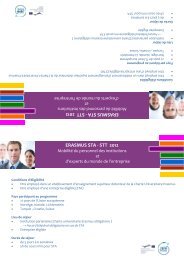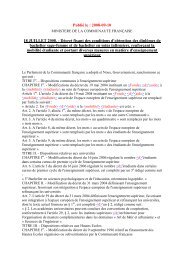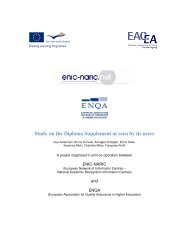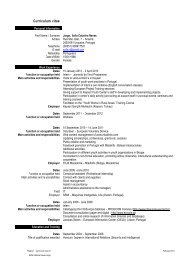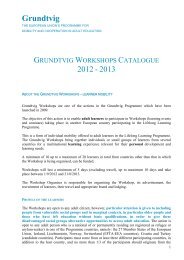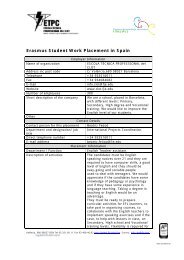Employers' view on studies abroad - Svenskt Näringsliv
Employers' view on studies abroad - Svenskt Näringsliv
Employers' view on studies abroad - Svenskt Näringsliv
You also want an ePaper? Increase the reach of your titles
YUMPU automatically turns print PDFs into web optimized ePapers that Google loves.
Employers’ <str<strong>on</strong>g>view</str<strong>on</strong>g> <strong>on</strong> <strong>studies</strong> <strong>abroad</strong><br />
Fredrik J<strong>on</strong>ss<strong>on</strong>, Internati<strong>on</strong>ella programk<strong>on</strong>toret<br />
Mikaela Almerud, project leader, <strong>Svenskt</strong> Näringsliv<br />
Patrick Krassén, translati<strong>on</strong> September 2010
Summary 1<br />
Summary<br />
Every year about 25,000 Swedish students choose to study or c<strong>on</strong>duct work practice <strong>abroad</strong>,<br />
through an exchange program or <strong>on</strong> their own. The number of students who study <strong>abroad</strong> yearly<br />
has been c<strong>on</strong>sistent over the period from 1998 to 2008. During the same period the number of<br />
students at Swedish universities has increased by 100, 000, a third. The share of students who<br />
spend time <strong>abroad</strong> has thus steadily decreased, a development c<strong>on</strong>trary to the ambiti<strong>on</strong>s Sweden<br />
has to remain competitive in an ever more globalized world, where internati<strong>on</strong>al experience and<br />
intercultural competence is becoming more and more important.<br />
The Swedish government as well as the universities have brought attenti<strong>on</strong> to this issue, and they<br />
have made substantial efforts during the last years to increase internati<strong>on</strong>alizati<strong>on</strong> in Swedish<br />
higher educati<strong>on</strong>. Since there is an absence of measurable factors, however, it is difficult to evaluate<br />
the effect of the means that have been invested in internati<strong>on</strong>alizati<strong>on</strong>, and if the priorities have<br />
been right. In the few evaluati<strong>on</strong> reports that exist the value of <strong>studies</strong> <strong>abroad</strong> is discussed in terms<br />
of “the student’s pers<strong>on</strong>al development” and “the added value created through meetings across borders”.<br />
These might be important aspects, but in additi<strong>on</strong> to them, other more measurable factors<br />
of quality need to be followed up and studied, such as the effects <strong>studies</strong> <strong>abroad</strong> have <strong>on</strong> students’<br />
chances of finding a job after graduati<strong>on</strong>, career opportunities and level of salary.<br />
During the spring of 2010 the C<strong>on</strong>federati<strong>on</strong> of Swedish Enterprise c<strong>on</strong>ducted its annual survey of<br />
labor market participati<strong>on</strong> after graduati<strong>on</strong>, based <strong>on</strong> teleph<strong>on</strong>e inter<str<strong>on</strong>g>view</str<strong>on</strong>g>s with more than 3,850<br />
students. The results showed that <strong>studies</strong> <strong>abroad</strong> have a positive effect <strong>on</strong> the student’s chances in<br />
the job market after graduati<strong>on</strong>. 23 % of resp<strong>on</strong>dents stated that they had studied or c<strong>on</strong>ducted<br />
work practice <strong>abroad</strong> some time during their <strong>studies</strong>. Out of these, 48 % stated that the time<br />
<strong>abroad</strong> had had significant or very significant part in landing them their first job. Students who<br />
had spent time <strong>abroad</strong> also had an average of 807 SEK more in m<strong>on</strong>thly entry pay.<br />
But how should these numbers be interpreted? Has it all to do with ambitious students, who<br />
would have an easier time finding a job than others anyway? Are students who c<strong>on</strong>duct part or all<br />
of their <strong>studies</strong> <strong>abroad</strong> really more attractive in the labor market? What do employers say?<br />
This report is the first in Sweden to more comprehensively affirm that internati<strong>on</strong>al experience in<br />
the form of <strong>studies</strong> or work practice is crucial and attractive in the labor market. When employers<br />
are asked what skills they look for, and the answers are compared to the skills employers find<br />
that students attain during time <strong>abroad</strong>, a clear c<strong>on</strong>necti<strong>on</strong> shows. Employers find, i.e., that students<br />
develop communicative skills, social competence, flexibility and initiative ability during time<br />
<strong>abroad</strong>. These skills are also sought after by almost all employers.<br />
Most attractive am<strong>on</strong>g employers is a Swedish degree with parts of the <strong>studies</strong> c<strong>on</strong>ducted <strong>abroad</strong><br />
– especially through work practice. In 99 cases out of 100, when employers are faced with a decisi<strong>on</strong><br />
between two candidates with otherwise equal merits, it is c<strong>on</strong>sidered an asset to have studied<br />
or c<strong>on</strong>ducted work practice <strong>abroad</strong>.<br />
Internati<strong>on</strong>al experience is thus c<strong>on</strong>sidered a competitive advantage in the labor market. Employers<br />
show a clear need and demand for students with internati<strong>on</strong>al experience, not least with work life<br />
experience. If it is possible to show solid evidence that <strong>studies</strong> <strong>abroad</strong> increases employability, it<br />
may be used to c<strong>on</strong>vince more students to spend time <strong>abroad</strong>. Studies <strong>abroad</strong> leads to both higher<br />
employability and increased internati<strong>on</strong>alizati<strong>on</strong>, and thus to increased quality in higher educati<strong>on</strong>.<br />
<strong>Svenskt</strong> Näringsliv
C<strong>on</strong>tent 2<br />
C<strong>on</strong>tent<br />
Summary ............................................................1<br />
1 Introducti<strong>on</strong>/Background. ..........................................3<br />
1.1 Earlier <strong>studies</strong> in other countries ...........................................3<br />
1.2 Employers’ <str<strong>on</strong>g>view</str<strong>on</strong>g> <strong>on</strong> <strong>studies</strong> <strong>abroad</strong> – a European perspective ..........................3<br />
1.3 Mixed experiences in Norway… ........................................... 4<br />
1.4 …Finland…. ....................................................... 4<br />
1.5 …and Denmark ......................................................5<br />
1.6 But what about Sweden? ................................................5<br />
2 Purpose. ....................................................... 7<br />
3 Method ........................................................ 8<br />
3.1 Correlati<strong>on</strong>s ....................................................... 8<br />
3.2 Questi<strong>on</strong>s . . . . . . . . . . . . . . . . . . . . . . . . . . . . . . . . . . . . . . . . . . . . . . . . . . . . . . . . . 8<br />
3.3 Selecti<strong>on</strong> ......................................................... 8<br />
4 Results ........................................................ 9<br />
4.1 Background questi<strong>on</strong>s. ................................................ 9<br />
4.2 Important criteria and skills when recruiting ...................................12<br />
4.3 The future ........................................................16<br />
4.4 Which skills do students develop during <strong>studies</strong> <strong>abroad</strong>?. ...........................17<br />
4.5 The “right” skills are developed during <strong>studies</strong> <strong>abroad</strong> ............................ 20<br />
4.6 Educati<strong>on</strong>, work practice and work life experience ................................21<br />
4.7 Degree . . . . . . . . . . . . . . . . . . . . . . . . . . . . . . . . . . . . . . . . . . . . . . . . . . . . . . . . . . 23<br />
5 C<strong>on</strong>clusi<strong>on</strong>s ................................................... 26<br />
5.1 Suggesti<strong>on</strong>s <strong>on</strong> following up ............................................ 27<br />
6 References .................................................... 28<br />
<strong>Svenskt</strong> Näringsliv
Introducti<strong>on</strong>/Background 3<br />
1 Introducti<strong>on</strong>/Background<br />
Globalizati<strong>on</strong> has a great impact <strong>on</strong> higher educati<strong>on</strong>, especially through increased internati<strong>on</strong>alizati<strong>on</strong>.<br />
In the bill 2008/09:175 Gränslös kunskap – högskolan i globaliseringens tid 1 the Swedish<br />
government inculcates that internati<strong>on</strong>al experiences and c<strong>on</strong>necti<strong>on</strong>s is a c<strong>on</strong>tributing factor in<br />
the development of quality in higher educati<strong>on</strong>, both <strong>on</strong> the level of the individual student and <strong>on</strong><br />
an aggregated level for society. Weight is put <strong>on</strong> the fact that internati<strong>on</strong>al movement am<strong>on</strong>g students<br />
has increased substantially around the world over the latest years, at the same time as the<br />
number of Swedish students studying <strong>abroad</strong> has decreased. This is regarded as a problem that<br />
needs to be dealt with actively, as the foreign experience of students c<strong>on</strong>tributes to the quality of higher<br />
educati<strong>on</strong> and prepares students for careers highly affected by globalizati<strong>on</strong> (p. 16).<br />
In <str<strong>on</strong>g>view</str<strong>on</strong>g> of the bill presented, the political ambiti<strong>on</strong> to enhance internati<strong>on</strong>al experience is clear,<br />
but is it a skill that Swedish companies are looking for? In what way does foreign experience c<strong>on</strong>tribute<br />
to quality 2 ? Employability is a factor that can be paired with quality. If it is possible to show<br />
clearly that foreign experience leads to higher employability am<strong>on</strong>g students, <strong>on</strong>e could also claim<br />
that foreign experience adds to the quality of higher educati<strong>on</strong>.<br />
Some previous inquiries <strong>on</strong> this topic have been made in Sweden, but their approach has been<br />
wider than specifically foreign experience, and their bases have been quite narrow. The lack of previous<br />
research is the reas<strong>on</strong> behind the present study. Similar <strong>studies</strong> in other countries have shown<br />
relatively diverse results, which makes this study even more interesting.<br />
1.1 Earlier <strong>studies</strong> in other countries<br />
Employers’ <str<strong>on</strong>g>view</str<strong>on</strong>g> <strong>on</strong> <strong>studies</strong> <strong>abroad</strong> have not been explicitly examined in the total number of <strong>studies</strong><br />
referred to here, except for the study c<strong>on</strong>ducted by Irma Garam in Finland. All references are<br />
however of interest, since the selected parts of the remaining <strong>studies</strong> examine employers’ <str<strong>on</strong>g>view</str<strong>on</strong>g> <strong>on</strong><br />
exchange <strong>studies</strong>. These are some of the findings of said <strong>studies</strong>.<br />
1.2 Employers’ <str<strong>on</strong>g>view</str<strong>on</strong>g> <strong>on</strong> <strong>studies</strong> <strong>abroad</strong> – a European perspective<br />
In the report The Professi<strong>on</strong>al value of ERASMUS mobility 3 <strong>on</strong>e chapter is devoted to the opini<strong>on</strong>s<br />
and <str<strong>on</strong>g>view</str<strong>on</strong>g>s of employers regarding exchange <strong>studies</strong> <strong>abroad</strong>. The study focuses <strong>on</strong> two groups:<br />
European organizati<strong>on</strong>s that have hired former ERASMUS students (about 1,500), and organizati<strong>on</strong>s<br />
that do not know whether they have hired any<strong>on</strong>e with ERASMUS experience or not<br />
(about 4,500). The resp<strong>on</strong>se frequency was 6 %. Aside from these groups a secti<strong>on</strong> where former<br />
ERASMUS students give their perspectives <strong>on</strong> exchange <strong>studies</strong> <strong>abroad</strong>.<br />
1.<br />
Swedish government, prop. 2008/09:175<br />
2.<br />
I the government bill Fokus på kunskap – kvalitet den högre utbildningen it is stated that employability in its broader<br />
sense, meaning the usefulness of the educati<strong>on</strong> program in questi<strong>on</strong> in the labor market, is an important result in coming<br />
quality evaluati<strong>on</strong>s.<br />
3.<br />
Teichler et al., The Professi<strong>on</strong>al Value of ERASMUS Mobility, 2006.<br />
<strong>Svenskt</strong> Näringsliv
Introducti<strong>on</strong>/Background 4<br />
The study refers to <strong>studies</strong> c<strong>on</strong>ducted earlier that have shown that the most important criteria for<br />
recruitment am<strong>on</strong>g employers are the academic competence of the recruited, and their pers<strong>on</strong>ality.<br />
In this study two additi<strong>on</strong>al skills are stated as important by employers: language (other than<br />
the native language) and computers. Central and Eastern European companies tend to place higher<br />
value <strong>on</strong> foreign experience than organizati<strong>on</strong> in Western Europe, the study also shows.<br />
The <str<strong>on</strong>g>view</str<strong>on</strong>g>s of employers and students regarding the relevance of internati<strong>on</strong>al experience for<br />
employment correlate relatively well. The study also shows that internati<strong>on</strong>al experience has<br />
impact <strong>on</strong> the distributi<strong>on</strong> of internati<strong>on</strong>al assignments; an employee with experience of <strong>studies</strong><br />
<strong>abroad</strong> is more likely to be assigned internati<strong>on</strong>al tasks in their occupati<strong>on</strong>. Newly hired employees<br />
are more likely to be assigned internati<strong>on</strong>al tasks by employers in and Eastern European companies<br />
than in Western European companies.<br />
Overall, newly hired employees with internati<strong>on</strong>al experience are c<strong>on</strong>sidered to have greater knowledge<br />
in areas related to this experience (i.e. language skills, cultural differences, etc.). They are also<br />
deemed more attractive to employers when it comes to more general attributes, such as adaptability,<br />
pr<strong>on</strong>eness to initiative, analytical skills and determinati<strong>on</strong>. This positive <str<strong>on</strong>g>view</str<strong>on</strong>g> of employees<br />
with experience from <strong>studies</strong> <strong>abroad</strong> is not limited to former ERASMUS students, but goes for<br />
every<strong>on</strong>e who has studied or d<strong>on</strong>e work practice <strong>abroad</strong>.<br />
In regard to wage levels and career opportunities, the differences between students with and without<br />
internati<strong>on</strong>al experience are not substantial, albeit they do exist. Especially in Central and<br />
Eastern European countries the differences tend to show. In these countries, the study shows that<br />
students with internati<strong>on</strong>al experience tend to have somewhat higher wages and somewhat better<br />
career opportunities than those without.<br />
The c<strong>on</strong>clusi<strong>on</strong> drawn is that internati<strong>on</strong>al experience is an important factor for employers when<br />
hiring.<br />
1.3 Mixed experiences in Norway…<br />
In the Norwegian study Studiemobilitet og arbeidsmarkedstilpasning 4 opini<strong>on</strong>s from employers are<br />
not stated. However, students’ experiences <strong>on</strong> what employers tend to look for are surveyed, giving<br />
an indirect profile of employers’ <str<strong>on</strong>g>view</str<strong>on</strong>g> <strong>on</strong> exchange <strong>studies</strong> <strong>abroad</strong>. The study shows that two out<br />
of three students find that Norwegian employers <str<strong>on</strong>g>view</str<strong>on</strong>g> exchange <strong>studies</strong> <strong>abroad</strong> as an asset. At the<br />
same time half of the surveyed students state that employers lack knowledge of the <strong>studies</strong> c<strong>on</strong>ducted<br />
<strong>abroad</strong>.<br />
1.4 …Finland…<br />
A Finnish study c<strong>on</strong>ducted by Irma Garam at CIMO shows that employers generally are doubtful<br />
of the benefits of foreign experience when it comes to skills in workplace-specific areas. They do <strong>on</strong><br />
the other hand c<strong>on</strong>sider exchange <strong>studies</strong> positive when it comes to pers<strong>on</strong>al development, internati<strong>on</strong>alizati<strong>on</strong>,<br />
etc. – i.e., more general skills that students develop during the exchange <strong>studies</strong>.<br />
This is also reflected in the recruitment process, where more than half of the resp<strong>on</strong>dents state that<br />
foreign experience is of no significance for recruitment, even though many employers state that it<br />
is a positive asset in general. N<strong>on</strong>e of the resp<strong>on</strong>dents state that it is a c<strong>on</strong>diti<strong>on</strong> for recruitment,<br />
however. 5<br />
4.<br />
NIFU, 2008/22<br />
5.<br />
CIMO, 2005/1.<br />
<strong>Svenskt</strong> Näringsliv
Introducti<strong>on</strong>/Background 5<br />
Internati<strong>on</strong>al experience is valued higher, not surprisingly, at companies that c<strong>on</strong>duct business<br />
internati<strong>on</strong>ally. This shows clearly when resp<strong>on</strong>dents have been asked to rate general skills such as<br />
reliability, social competence, language skills and intercultural competence. Skills that typically are<br />
acquired during <strong>studies</strong> <strong>abroad</strong>, such as language skills and intercultural competence, were generally<br />
ranked very low by employers. It is however worth noticing that 20 % of resp<strong>on</strong>dents rated<br />
these skills as highly important. From this, Garam draws the c<strong>on</strong>clusi<strong>on</strong> that internati<strong>on</strong>al experience<br />
may be of great significance when applying for jobs with internati<strong>on</strong>ally related tasks, but<br />
that exchange <strong>studies</strong> may have negative effects when applying for a job in purely domestic companies.<br />
6<br />
1.5 …and Denmark<br />
The Danish institute for internati<strong>on</strong>al educati<strong>on</strong>, CIRIUS, presents in the survey “Betydningen<br />
af uddannelsesophold i udlandet” a fairly positive <str<strong>on</strong>g>view</str<strong>on</strong>g> of <strong>studies</strong> <strong>abroad</strong> am<strong>on</strong>g students.<br />
Employers tend to have, in light of an increased internati<strong>on</strong>alizati<strong>on</strong> generally, a higher need for<br />
employees with internati<strong>on</strong>al competence. Internati<strong>on</strong>al experience is valued as an important asset<br />
in recruitment, and such experiences are c<strong>on</strong>sidered necessary for some<strong>on</strong>e aspiring to an internati<strong>on</strong>al<br />
career. A number of internati<strong>on</strong>al companies in the study state that the lack of Danish workers<br />
with internati<strong>on</strong>al competence makes the companies more pr<strong>on</strong>e to hire n<strong>on</strong>-Danish workers.<br />
Apart from this, the study also shows:<br />
• The importance of genuine academic exchange; “academic tourism” should be avoided.<br />
• That work experience is more important than <strong>studies</strong> <strong>abroad</strong>.<br />
• That students mainly attain pers<strong>on</strong>al skills and experiences during <strong>studies</strong> <strong>abroad</strong> and few<br />
practical skills, according to employers.<br />
• That employees <strong>on</strong> the c<strong>on</strong>trary find that it is mainly practical skills <strong>on</strong>e attains during <strong>studies</strong><br />
<strong>abroad</strong>. 7<br />
1.6 But what about Sweden?<br />
The report Utlandsstudier – till vilken nytta? 8 from the Swedish Nati<strong>on</strong>al Agency for Higher Educati<strong>on</strong><br />
describes employers’ <str<strong>on</strong>g>view</str<strong>on</strong>g> <strong>on</strong> the value of <strong>studies</strong> <strong>abroad</strong>. The report has a qualitative focus<br />
and is based <strong>on</strong> inter<str<strong>on</strong>g>view</str<strong>on</strong>g>s with 34 companies, which show that:<br />
• Most employers regard social competence as highly valuable.<br />
• A majority of companies has hired employees with foreign experience, but without having<br />
asked about it.<br />
• 1/3 of resp<strong>on</strong>dents believe workers with internati<strong>on</strong>al experience more easily can advance<br />
quickly in their career.<br />
• Employers prefer a Swedish degree with part of the <strong>studies</strong> c<strong>on</strong>ducted <strong>abroad</strong>.<br />
• Employers fins it difficult to assess the value of <strong>studies</strong> <strong>abroad</strong>.<br />
6.<br />
Ibid..<br />
7.<br />
CIRIUS, 2008<br />
8.<br />
Swedish Nati<strong>on</strong>al Agency for Higher Educati<strong>on</strong> reports (Högskoleverkets rapportserie), 1999:10R.<br />
<strong>Svenskt</strong> Näringsliv
Introducti<strong>on</strong>/Background 6<br />
In additi<strong>on</strong> to this, the report points out that both students and the higher educati<strong>on</strong> sector need<br />
more robust knowledge about employers’ competence needs. The report however also states that<br />
the results from the inter<str<strong>on</strong>g>view</str<strong>on</strong>g>s are not sufficiently representative to draw any c<strong>on</strong>clusi<strong>on</strong>s from.<br />
One other survey should also be menti<strong>on</strong>ed. A thesis from Jönköping Internati<strong>on</strong>al Business<br />
School, entitled “Studies <strong>abroad</strong> – an investment for the future?”, surveyed through qualitative<br />
<strong>studies</strong> the priorities made by eleven companies in the recruitment process. The results of this<br />
survey point to a very limited knowledge am<strong>on</strong>g employers about exchange <strong>studies</strong>. Based <strong>on</strong> this,<br />
the authors draw the c<strong>on</strong>clusi<strong>on</strong> that employers, finding it difficult to assess the value of work<br />
practice or <strong>studies</strong> c<strong>on</strong>ducted <strong>abroad</strong>, tend to place less emphasis <strong>on</strong> these merits in the recruitment<br />
process. Instead, as in the case of the aforementi<strong>on</strong>ed ERASMUS-study, it is the pers<strong>on</strong>ality<br />
of the employee that is c<strong>on</strong>sidered the most important factor, level of educati<strong>on</strong>/degree being<br />
equal (grades matter little). The study was c<strong>on</strong>ducted am<strong>on</strong>g both medium-sized and large companies,<br />
but no noticeable difference was found between the two categories c<strong>on</strong>cerning the <str<strong>on</strong>g>view</str<strong>on</strong>g> of<br />
exchange <strong>studies</strong>, or the need thereof. Here, though, the material for the study must be c<strong>on</strong>sidered<br />
too narrow for any c<strong>on</strong>clusi<strong>on</strong> to be drawn regarding the nati<strong>on</strong>al level.<br />
<strong>Svenskt</strong> Näringsliv
Purpose 7<br />
2 Purpose<br />
The purpose of this study is to show Swedish employers’ <str<strong>on</strong>g>view</str<strong>on</strong>g> <strong>on</strong> <strong>studies</strong> <strong>abroad</strong>. There is a need<br />
for this type of survey in Sweden, but little has been made. Studies that are available in Sweden<br />
and internati<strong>on</strong>ally have shown varying results. It is clear that <strong>studies</strong> <strong>abroad</strong> have a functi<strong>on</strong>, but<br />
there is very little evidence of how important they are in for example a recruitment process.<br />
In light of this, it is important to establish Swedish employers’ <str<strong>on</strong>g>view</str<strong>on</strong>g> <strong>on</strong> foreign exchange <strong>studies</strong><br />
– what good are they, what is preferred, and should they be developed in any certain directi<strong>on</strong> for<br />
employers to be able to make use of their employees’ experiences?<br />
<strong>Svenskt</strong> Näringsliv
Method 8<br />
3 Method<br />
The study has been c<strong>on</strong>ducted in cooperati<strong>on</strong> between the Internati<strong>on</strong>al Programme Office for<br />
Educati<strong>on</strong> and Training (IPK) and the C<strong>on</strong>federati<strong>on</strong> of Swedish Enterprise (SN). Novus Opini<strong>on</strong><br />
has <strong>on</strong> behalf of IPK and SN c<strong>on</strong>ducted a quantitative survey through web surveys am<strong>on</strong>g Swedish<br />
companies and government authorities regarding their <str<strong>on</strong>g>view</str<strong>on</strong>g> <strong>on</strong> <strong>studies</strong> <strong>abroad</strong>. The material for the<br />
survey was developed in close cooperati<strong>on</strong> between IPK, SN and Novus Opini<strong>on</strong>.<br />
3.1 Correlati<strong>on</strong>s<br />
An important part of the survey is to assess any possible correlati<strong>on</strong>s between those skills that<br />
employers assume students acquire during exchange <strong>studies</strong> <strong>abroad</strong> and which skills they place<br />
value <strong>on</strong> when recruiting, as well as which skills they believe will be important in the future. To<br />
statistically show these possible significant discrepancies a c<strong>on</strong>fidence interval of 95 % is used,<br />
which means that in 19 out of 20 of those cases where the discrepancy is deemed to be significant<br />
in comparis<strong>on</strong> to the total result the deviati<strong>on</strong> is not coincidental.<br />
3.2 Questi<strong>on</strong>s<br />
The choice of questi<strong>on</strong>s partly correlates with the questi<strong>on</strong>s asked by CIMO in its survey of Finnish<br />
employers’ <str<strong>on</strong>g>view</str<strong>on</strong>g> <strong>on</strong> <strong>studies</strong> <strong>abroad</strong>, since these questi<strong>on</strong>s are not country-sensitive. Based <strong>on</strong><br />
these questi<strong>on</strong>s a questi<strong>on</strong>naire with 33 questi<strong>on</strong>s was developed, which was distributed to 4,764<br />
companies and public authorities.<br />
3.3 Selecti<strong>on</strong><br />
As the survey seeks to have an as highly representative selecti<strong>on</strong> as possible am<strong>on</strong>g SN’s almost<br />
60,000 member companies, these were divided into small (less than 9 employees), medium<br />
(10-49) and large (over 50) before selecti<strong>on</strong> was made. The distributi<strong>on</strong> of trades am<strong>on</strong>g surveyed<br />
companies is large; about 50 % of companies are members of the three large trade organizati<strong>on</strong>s:<br />
Almega (employer and trade organisati<strong>on</strong> for the Swedish service sector), Svensk Handel (the Swedish<br />
Trade Federati<strong>on</strong>) and Teknikföretagen (the Associati<strong>on</strong> of Swedish Engineering Industries).<br />
The final number of resp<strong>on</strong>dents was 973 of the 4,764 c<strong>on</strong>tacted, which means a resp<strong>on</strong>se frequency<br />
of 21 % (20 % am<strong>on</strong>g private businesses and 43 % am<strong>on</strong>g public authorities). The relatively<br />
low resp<strong>on</strong>se frequency may be due to a number of reas<strong>on</strong>s – <strong>on</strong>e perhaps that an extensive<br />
recruitment survey was sent out by SN to member companies shortly before this survey, another<br />
that this survey c<strong>on</strong>sisted of a large number of questi<strong>on</strong>s.<br />
<strong>Svenskt</strong> Näringsliv
Results 9<br />
4 Results<br />
4.1 Background questi<strong>on</strong>s<br />
The purpose of the inquiry was to survey the <str<strong>on</strong>g>view</str<strong>on</strong>g>s am<strong>on</strong>g primarily companies that hire workers<br />
with university degrees. Therefore a c<strong>on</strong>trol questi<strong>on</strong> was asked, to identify the relevant companies.<br />
Figure 1<br />
Public authorities<br />
Do you hire workers with<br />
university degrees?<br />
2%<br />
Yes<br />
No<br />
98%<br />
Private companies<br />
Do you hire workers with<br />
university degrees?<br />
4%<br />
Yes<br />
No<br />
Unsure<br />
38%<br />
58%<br />
The discrepancy between public authorities and private companies is significant, and not unexpected.<br />
Many smaller companies with a lower number of employees with university degrees were<br />
not part of the survey. This leads to a relatively low share of companies stating that they hire workers<br />
with university degrees. The larger the company, the higher the share of “Yes”-replies.<br />
Resp<strong>on</strong>dents were also asked to state the approximate share of workers with university degrees at<br />
the workplace. A significant discrepancy exists between the public and private sector.<br />
<strong>Svenskt</strong> Näringsliv
Results 10<br />
Figure 2 – How many of your employees have university degrees?<br />
Companies<br />
38%<br />
29%<br />
12%<br />
9%<br />
11%1%<br />
Authorities<br />
1% 7%<br />
9%<br />
25%<br />
58%<br />
0% 20% 40% 60% 80% 100%<br />
Less than 10% 10-24% 25-49% 50-75% More than 75% Unsure<br />
The numbers show a clear discrepancy in level of educati<strong>on</strong> between public and private sector. In<br />
authorities a majority of employees have university degrees, which is quite unusual in private companies.<br />
It should be noted however that there is a significant difference between small and large<br />
companies in this aspect. These numbers should be kept in mind when looking at the following<br />
results.<br />
The distributi<strong>on</strong> in size of companies and authorities resp<strong>on</strong>ding is even, which is in line with the<br />
focus <strong>on</strong> achieving a result which is as representative as possible.<br />
Table1<br />
5–9 employees 10–49 employees 50– employees Authorities TOTAL<br />
Netto selecti<strong>on</strong> 1 415 1 459 1 425 264 4 563<br />
Replies 274 274 312 113 973<br />
Reply frequency 19 % 19 % 22 % 43 % 21 %<br />
Emp’s with uni deg. 43 % 59 % 90 % 98 %<br />
Further background questi<strong>on</strong>s have c<strong>on</strong>cerned whether the companies/authorities are internati<strong>on</strong>al<br />
in their work or not. To survey this the following questi<strong>on</strong>s were asked:<br />
• Do you engage in internati<strong>on</strong>al cooperati<strong>on</strong>?<br />
• Have you developed internati<strong>on</strong>al c<strong>on</strong>necti<strong>on</strong>s for export/import?<br />
• Do you have plans to expand internati<strong>on</strong>ally?<br />
• Do you have offices outside Sweden?<br />
<strong>Svenskt</strong> Näringsliv
Results 11<br />
Figure 3<br />
Internati<strong>on</strong>al<br />
cooperati<strong>on</strong><br />
61%<br />
Small companies:<br />
Large companies:<br />
93%<br />
Export/import<br />
c<strong>on</strong>tacts<br />
18%<br />
59%<br />
Small companies:<br />
Large companies:<br />
Plans to expand<br />
internati<strong>on</strong>ally<br />
41%<br />
Small companies:<br />
Large companies:<br />
50%<br />
Offices outside<br />
Sweden<br />
14%<br />
29%<br />
Small companies:<br />
Large companies:<br />
0% 20% 40% 60% 80% 100%<br />
Companies<br />
Authorities<br />
The majority of companies do not have offices outside Sweden, though it is more comm<strong>on</strong> the<br />
larger the company is. It is however more comm<strong>on</strong> for companies to have c<strong>on</strong>tacts regarding<br />
export/import and internati<strong>on</strong>al cooperati<strong>on</strong>s. More than 50 % of companies have stated this.<br />
Significant differences are shown when the share of employees with university degrees is compared<br />
with the number of companies stating that they are involved in some kind of internati<strong>on</strong>al cooperati<strong>on</strong>.<br />
They higher the share of employees with university degrees, the more likely it is the company<br />
is active internati<strong>on</strong>ally.<br />
When it comes to public authorities, less than 20 % have offices <strong>abroad</strong> or c<strong>on</strong>tacts for export/<br />
import. On the other hand 93 % state that they have internati<strong>on</strong>al cooperati<strong>on</strong> in some form.<br />
Furthermore, the survey shows that the larger the company is, the more likely it is to have internati<strong>on</strong>al<br />
activity in some form. Larger companies also put more emphasis <strong>on</strong> internati<strong>on</strong>al experience<br />
when recruiting (which will be discussed further below). From this follows quite naturally that<br />
the use of English increases with the size of the company. 84 % of the largest companies state that<br />
English is used daily. The same goes for other European languages, which are used more frequently<br />
in larger companies than in smaller.<br />
<strong>Svenskt</strong> Näringsliv
Results 12<br />
Figure 4<br />
English<br />
73%<br />
76%<br />
Small companies:<br />
Large companies:<br />
Other European language<br />
25%<br />
23%<br />
N<strong>on</strong>-European language<br />
4%<br />
6%<br />
No<br />
24%<br />
23%<br />
0% 20% 40% 60% 80% 100%<br />
Companies<br />
Authorities<br />
4.2 Important criteria and skills when recruiting<br />
To find out which criteria are most important for employers when recruiting, a number of criteria<br />
were given to rate. When including both private and public sector, the three most important<br />
criteria are work experience, <strong>studies</strong> suited for the positi<strong>on</strong> and suitable references. These three<br />
criteria, even though important for both private companies and public authorities, tend to be<br />
regarded as more important when authorities are hiring. Least important are criteria such as <strong>studies</strong><br />
<strong>abroad</strong>, work practice <strong>abroad</strong> and the employer’s knowledge of the pers<strong>on</strong> in questi<strong>on</strong>. Authorities<br />
tend to hold these criteria as slightly more important than companies, however.<br />
Figure 5 – Criteria when recruiting – Companies<br />
How important do you c<strong>on</strong>sider the following criteria/skills to be when recruiting?<br />
Good references<br />
59%<br />
34%<br />
3% 4%<br />
Suitable <strong>studies</strong><br />
56%<br />
35%<br />
7% 2%<br />
Work experience<br />
suitable for the positi<strong>on</strong><br />
56%<br />
33%<br />
8% 1%<br />
2%<br />
Work experience<br />
in general<br />
36%<br />
48%<br />
13%<br />
1% 1%<br />
Recommendati<strong>on</strong>s<br />
24%<br />
46%<br />
21%<br />
7% 1%<br />
Good grades<br />
12%<br />
62%<br />
22%<br />
4%<br />
0% 20% 40% 60% 80% 100%<br />
Very important Important Not so important Not important at all D<strong>on</strong>’t know<br />
<strong>Svenskt</strong> Näringsliv
Results 13<br />
Figure 6 – Criteria when recruiting – Authorities<br />
How important do you c<strong>on</strong>sider the following criteria/skills to be when recruiting?<br />
Suitable <strong>studies</strong><br />
86%<br />
12%<br />
2%<br />
Good references<br />
77%<br />
21%<br />
2%<br />
Work experience<br />
suitable for the positi<strong>on</strong><br />
74%<br />
22%<br />
4%<br />
1%<br />
Work experience<br />
in general<br />
19%<br />
58%<br />
23%<br />
1%<br />
Good grades<br />
15%<br />
64%<br />
20%<br />
1%<br />
Recommendati<strong>on</strong>s<br />
5%<br />
17%<br />
37%<br />
41%<br />
0% 20% 40% 60% 80% 100%<br />
Very important Important Not so important Not important at all D<strong>on</strong>’t know<br />
It is also clear that authorities tend to place more importance <strong>on</strong> the “top” criteria, compared to<br />
companies, whose priorities tend to be more modest.<br />
Employers also replied regarding the importance placed <strong>on</strong> pers<strong>on</strong>al characteristics when recruiting,<br />
which skills students are expected to develop/enhance during <strong>studies</strong> <strong>abroad</strong>, and what kind<br />
of skills employers think will be important in 10-15 years.<br />
Figure 7 – How important do you c<strong>on</strong>sider the following pers<strong>on</strong>al characteristics when hiring? (Companies)<br />
Resp<strong>on</strong>sible<br />
90%<br />
8% 1%<br />
Ability to handle<br />
customers<br />
81%<br />
15%<br />
1% 3%<br />
Momentum [/endurance]<br />
75%<br />
22%<br />
1%<br />
2%<br />
Problem solving ability<br />
74%<br />
24%<br />
1% 1%<br />
Ambiti<strong>on</strong><br />
74%<br />
22%<br />
3% 2%<br />
Initiative skill<br />
Communicative skills<br />
73%<br />
70%<br />
Small companies: 70%<br />
Large companies: 53%<br />
25%<br />
28%<br />
2%<br />
1% 1%<br />
Social skills<br />
70%<br />
26%<br />
2% 2%<br />
Flexibility<br />
62%<br />
36%<br />
1% 1%<br />
Stress capacity<br />
60%<br />
37%<br />
2% 1%<br />
0% 20% 40% 60% 80% 100%<br />
Very important Important Not so important Not important at all D<strong>on</strong>’t know<br />
<strong>Svenskt</strong> Näringsliv
Results 14<br />
Figure 8 – How important do you c<strong>on</strong>sider the following pers<strong>on</strong>al characteristics when hiring? (Authorities)<br />
Resp<strong>on</strong>sible<br />
91%<br />
8% 1%<br />
Communicative skills<br />
77%<br />
22%<br />
1%<br />
Problem solving ability<br />
72%<br />
27%<br />
1%<br />
Initiative skill<br />
68%<br />
31%<br />
1% 1%<br />
Knowledge of<br />
relevant subject<br />
Momentum [/endurance]<br />
68%<br />
65%<br />
25%<br />
32%<br />
7%<br />
1% 3%<br />
Social skills<br />
62%<br />
36%<br />
1% 1%<br />
Ability to handle<br />
customers<br />
60%<br />
28%<br />
9%<br />
3%<br />
Flexibility<br />
42%<br />
52%<br />
5%<br />
1%<br />
Stress capacity<br />
38%<br />
58%<br />
4% 1%<br />
0% 20% 40% 60% 80% 100%<br />
Very important Important Not so important Not important at all D<strong>on</strong>’t know<br />
As expected, many skills are ranked as important or very important when recruiting. If the questi<strong>on</strong><br />
is formulated in a way where each skill is to be valued in itself, most resp<strong>on</strong>dents will state<br />
that most skills are important or very important. Some differences are present however. Below are<br />
the skills that employers value the least.<br />
Figure 9 – How important do you c<strong>on</strong>sider the following pers<strong>on</strong>al characteristics when hiring? (Companies)<br />
Creativity<br />
Tolerance<br />
47%<br />
54%<br />
Small companies: 63%<br />
Large companies: 33%<br />
48%<br />
40%<br />
5%<br />
5%<br />
1%<br />
Analytic skills<br />
42%<br />
46%<br />
11% 1%<br />
Self-c<strong>on</strong>fidence<br />
Language skills<br />
– English<br />
Knowledge of<br />
relevant subject<br />
Leadership ability<br />
41%<br />
39%<br />
33%<br />
24%<br />
Small companies: 28%<br />
Large companies: 51%<br />
53%<br />
39%<br />
51%<br />
55%<br />
4%<br />
16% 5% 1%<br />
15% 1%<br />
20% 1% 2%<br />
Intercultural competence<br />
14%<br />
40%<br />
32%<br />
13%<br />
1%<br />
Language skills<br />
– Other languages<br />
4%<br />
28%<br />
40%<br />
28%<br />
1%<br />
0% 20% 40% 60% 80% 100%<br />
Very important Important Not so important Not important at all D<strong>on</strong>’t know<br />
<strong>Svenskt</strong> Näringsliv
Results 15<br />
Language skills and intercultural competence are <str<strong>on</strong>g>view</str<strong>on</strong>g>ed as less important and significantly differs<br />
from the other skills. Particularly skills in other languages than the mother t<strong>on</strong>gue and English is<br />
deemed unimportant when recruiting. One explanati<strong>on</strong> for this might be that a pers<strong>on</strong> who speaks<br />
multiple languages is of little use if that pers<strong>on</strong> has low communicative or social skills.<br />
Also am<strong>on</strong>g authorities intercultural competence and language skills place low in the ranking.<br />
Figure 10 – How important do you c<strong>on</strong>sider the following pers<strong>on</strong>al characteristics when hiring? (Authorities)<br />
Ambiti<strong>on</strong>s<br />
58%<br />
39%<br />
2% 1% 1%<br />
Analytic skills<br />
57%<br />
41%<br />
2% 1%<br />
Tolerance<br />
45%<br />
51%<br />
3% 1%<br />
Creativity<br />
44%<br />
50%<br />
5% 1%<br />
Language skills<br />
– English<br />
41%<br />
47%<br />
11%<br />
1% 1%<br />
Self-c<strong>on</strong>fidence<br />
27%<br />
68%<br />
5% 1%<br />
Intercultural competence<br />
17%<br />
59%<br />
19%<br />
1% 4%<br />
Leadership ability<br />
14%<br />
55%<br />
25%<br />
1% 5%<br />
Language skills<br />
– Other languages<br />
3%<br />
32%<br />
52%<br />
12%<br />
1%<br />
0% 20% 40% 60% 80% 100%<br />
Very important Important Not so important Not important at all D<strong>on</strong>’t know<br />
4.2.1 Internati<strong>on</strong>al skills important in larger companies<br />
Large companies have a higher need for “internati<strong>on</strong>al” skills. Statistics from the survey also show<br />
that larger companies tend to c<strong>on</strong>duct business internati<strong>on</strong>ally to a higher degree than smaller<br />
companies. The figures below show how companies differ in their valuati<strong>on</strong> of internati<strong>on</strong>al skills.<br />
Figures with a +/- indicator have a statistically significant and n<strong>on</strong>-random deviati<strong>on</strong> from the<br />
average value for that skill.<br />
<strong>Svenskt</strong> Näringsliv
Results 16<br />
Figure 11 – How important do you c<strong>on</strong>sider the following skills when recruiting?<br />
(share who answered “important”/”very important” – companies)<br />
Intercultural competence<br />
Language skills – English<br />
Language skills – Other languages<br />
71 -%<br />
52% 50 -%<br />
25%<br />
79%<br />
31%<br />
84+%<br />
70+%<br />
41+%<br />
55%<br />
78%<br />
32%<br />
5-9 employees 10 -49 employees 50+ employees Total average<br />
Companies with 50 or more employees differ significantly from the average values for every skill<br />
c<strong>on</strong>nected to internati<strong>on</strong>alizati<strong>on</strong>. Most notable is “intercultural competence”, which 55 % of<br />
companies state is of some or much importance when recruiting. Am<strong>on</strong>g companies with 50 or<br />
more employees this rate is even higher, 70 %. No classificati<strong>on</strong> according to size has been made<br />
am<strong>on</strong>g authorities, but the general result is worth noting – <strong>on</strong> every questi<strong>on</strong> authorities rank these<br />
skills higher than both small and large companies.<br />
4.3 The future<br />
Companies and authorities were also asked to “predict” the future, regarding which skills they<br />
thought would be most important in 10-15 years. Here also there is a discrepancy between companies<br />
and authorities.<br />
Figure 12 – Are there any pers<strong>on</strong>al skills in employees that will become increasingly important in the coming<br />
10-15 years? If so, which? (companies)<br />
Communicative skills<br />
Ability to handle customers<br />
Social skills<br />
Momentum[/endurance]<br />
Problem solving capacity<br />
Language skills – English<br />
Resp<strong>on</strong>sibility<br />
Initiative skill<br />
Creativity<br />
Stress handling capacity<br />
Flexibility<br />
Intercultural competence<br />
Ambiti<strong>on</strong><br />
Language skills – other languages<br />
Leadership skills<br />
Analytical skills<br />
Tolerance<br />
Knowledge of relevant subject<br />
Self-c<strong>on</strong>fidence<br />
38%<br />
37%<br />
37%<br />
34%<br />
33%<br />
31%<br />
30%<br />
29%<br />
29%<br />
27%<br />
24%<br />
22%<br />
21%<br />
20%<br />
51%<br />
51%<br />
48%<br />
46%<br />
56%<br />
0% 20% 40% 60%<br />
<strong>Svenskt</strong> Näringsliv
Results 17<br />
Companies are c<strong>on</strong>vinced that communicative skills will become even more important in the<br />
future. Social skills and ability to interact with others also rank high. Worth noticing is that some<br />
skills that rank low or very low in a recruitment situati<strong>on</strong> today – such as language skills and intercultural<br />
competence – are ranked a lot higher in what is c<strong>on</strong>sidered to become important in 10-15<br />
years. There are also differences based <strong>on</strong> the size of the company. Larger companies are more<br />
inclined to c<strong>on</strong>sider communicative skills as becoming important in 10-15 years than smaller companies,<br />
who in turn believe resp<strong>on</strong>sibility will become more important.<br />
Authorities also believe communicative skills will become more important in the future, and in<br />
general are more pr<strong>on</strong>e to believe that skills that are in some way “internati<strong>on</strong>al” will become more<br />
important.<br />
Figure 13 – Are there any pers<strong>on</strong>al skills in employees that will become increasingly important in the coming<br />
10-15 years? If so, which? (authorities)<br />
Communicative skills<br />
Intercultural competence<br />
Language skills – English<br />
Problem solving capacity<br />
Language skills – other languages<br />
Social skills<br />
Momentum[/endurance]<br />
Leadership skills<br />
Analytical skills<br />
Stress handling capacity<br />
Knowledge of relevant subject<br />
Flexibility<br />
Ability to handle customers<br />
Creativity<br />
Tolerance<br />
Initiative skill<br />
Resp<strong>on</strong>sibility<br />
Self-c<strong>on</strong>fidence<br />
Ambiti<strong>on</strong><br />
12%<br />
12%<br />
28%<br />
27%<br />
27%<br />
27%<br />
25%<br />
25%<br />
24%<br />
23%<br />
21%<br />
18%<br />
32%<br />
32%<br />
39%<br />
38%<br />
44%<br />
50%<br />
55%<br />
0% 20% 40% 60%<br />
Communicative skills is still c<strong>on</strong>sidered the most important skill in the future, but immediately<br />
following are a number of “internati<strong>on</strong>al” skills, am<strong>on</strong>g them intercultural competence and language<br />
skills (both English and other languages).<br />
4.4 Which skills do students develop during <strong>studies</strong> <strong>abroad</strong>?<br />
Employers were also asked to rate which skills/qualities they believe students develop during <strong>studies</strong><br />
<strong>abroad</strong>. The questi<strong>on</strong>s that were asked were the same as in the previous two secti<strong>on</strong>s. Am<strong>on</strong>g<br />
companies, language skills and intercultural competence scored highest, followed by communicative<br />
skills, flexibility and self-c<strong>on</strong>fidence. The <str<strong>on</strong>g>view</str<strong>on</strong>g> that students do not develop any skills at all is<br />
uncomm<strong>on</strong>, though analytical skills ranks lowest am<strong>on</strong>g the alternatives given to employers in the<br />
survey.<br />
<strong>Svenskt</strong> Näringsliv
Results 18<br />
Figure 14 and 15 – To what extent do you believe pers<strong>on</strong>s with experience from <strong>studies</strong> or work practice at<br />
university level <strong>abroad</strong> develop the following skills/qualities? (Companies)<br />
Language skills – English<br />
72%<br />
16%<br />
1% 1% 10%<br />
Intercultural competence<br />
52%<br />
32%<br />
6% 1% 10%<br />
Language skills – other languages<br />
51%<br />
25%<br />
8% 1%<br />
14%<br />
Communicative skills<br />
44%<br />
36%<br />
7% 1%<br />
12%<br />
Self-c<strong>on</strong>fidence<br />
42%<br />
38%<br />
5% 2%<br />
13%<br />
Flexibility<br />
41%<br />
38%<br />
8% 1%<br />
12%<br />
Social skills<br />
37%<br />
42%<br />
8% 1%<br />
12%<br />
Tolerance<br />
32%<br />
39%<br />
13%<br />
3%<br />
14%<br />
Momentum[/endurance]<br />
28%<br />
39%<br />
13%<br />
5%<br />
15%<br />
Initiative skill<br />
24%<br />
43%<br />
13%<br />
4%<br />
16%<br />
0% 20% 40% 60% 80% 100%<br />
Skill developed significantly Skill developed well Skill developed somewhat Skill not developed D<strong>on</strong>’t know<br />
Ambiti<strong>on</strong><br />
20%<br />
48%<br />
12%<br />
4%<br />
16%<br />
Ability to handle customers<br />
19%<br />
40%<br />
21%<br />
4%<br />
16%<br />
Resp<strong>on</strong>sibility<br />
17%<br />
44%<br />
18%<br />
5%<br />
16%<br />
Creativity<br />
17%<br />
39%<br />
20%<br />
5%<br />
18%<br />
Problem solving capacity<br />
16%<br />
45%<br />
19%<br />
5%<br />
15%<br />
Knowledge of relevant subject<br />
14%<br />
37%<br />
27%<br />
6%<br />
16%<br />
Stress handling capacity<br />
13%<br />
40%<br />
23%<br />
7%<br />
18%<br />
Leadership skills<br />
10%<br />
36%<br />
30%<br />
7%<br />
17%<br />
Analytical skills<br />
9%<br />
38%<br />
27%<br />
9%<br />
17%<br />
0% 20% 40% 60% 80% 100%<br />
Skill developed significantly Skill developed well Skill developed somewhat Skill not developed D<strong>on</strong>’t know<br />
<strong>Svenskt</strong> Näringsliv
Results 19<br />
Figure 16 and 17 – To what extent do you believe pers<strong>on</strong>s with experience from <strong>studies</strong> or work practice at<br />
university level <strong>abroad</strong> develop the following skills/qualities? (Authorities)<br />
Language skills – English<br />
70%<br />
23%<br />
1%<br />
Intercultural competence<br />
65%<br />
24%<br />
2% 2% 7%<br />
Language skills – other languages<br />
49%<br />
31%<br />
7% 1%<br />
13%<br />
Communicative skills<br />
41%<br />
45%<br />
2%<br />
12%<br />
Flexibility<br />
41%<br />
40%<br />
6% 1%<br />
12%<br />
Self-c<strong>on</strong>fidence<br />
41%<br />
48%<br />
5%<br />
7%<br />
Social skills<br />
37%<br />
42%<br />
10%<br />
11%<br />
Initiative skill<br />
27%<br />
38%<br />
13%<br />
5%<br />
18%<br />
Momentum[/endurance]<br />
23%<br />
44%<br />
11%<br />
5%<br />
17%<br />
Problem solving capacity<br />
21%<br />
41%<br />
19%<br />
19%<br />
0% 20% 40% 60% 80% 100%<br />
Skill developed significantly Skill developed well Skill developed somewhat Skill not developed D<strong>on</strong>’t know<br />
Tolerance<br />
38%<br />
41%<br />
9%<br />
12%<br />
Knowledge of relevant subject<br />
22%<br />
45%<br />
14%<br />
3%<br />
17%<br />
Ambiti<strong>on</strong><br />
20%<br />
43%<br />
17%<br />
5%<br />
14%<br />
Ability to handle customers<br />
14%<br />
42%<br />
19%<br />
3%<br />
23%<br />
Resp<strong>on</strong>sibility<br />
14%<br />
45%<br />
19%<br />
5%<br />
18%<br />
Creativity<br />
14%<br />
47%<br />
14%<br />
3%<br />
22%<br />
Analytical skills<br />
12%<br />
41%<br />
21%<br />
4%<br />
23%<br />
Stress handling capacity<br />
8%<br />
42%<br />
24%<br />
5%<br />
20%<br />
Leadership skills<br />
6%<br />
36%<br />
31%<br />
5%<br />
23%<br />
0% 20% 40% 60% 80% 100%<br />
Skill developed significantly Skill developed well Skill developed somewhat Skill not developed D<strong>on</strong>’t know<br />
<strong>Svenskt</strong> Näringsliv
Results 20<br />
The results show that the skills that authorities mainly believe students develop during <strong>studies</strong><br />
<strong>abroad</strong> are language skills and intercultural competence. This is also reflected in companies’<br />
answers. Aside from these skills, students are c<strong>on</strong>sidered to develop their communicative skills,<br />
flexibility and self-c<strong>on</strong>fidence.<br />
4.5 The “right” skills are developed during <strong>studies</strong> <strong>abroad</strong><br />
The results are interesting in themselves, but even more interesting is cross-comparing them: are<br />
the skills important when recruiting the same as those that employers c<strong>on</strong>sider to develop during<br />
<strong>studies</strong> <strong>abroad</strong>?<br />
Language skills – English<br />
Language skills – other languages<br />
Intercultural competence<br />
Communicative skills<br />
Flexibility<br />
Social skills<br />
Developed<br />
Momentum<br />
[/endurance]<br />
Ambiti<strong>on</strong> Initiative skill<br />
Resp<strong>on</strong>sibility<br />
Problem solving capacity<br />
Ability to handle customers<br />
Knowledge of relevant subject<br />
Leadership skills<br />
Stress handling capacity<br />
importance<br />
The diagram shows that some of the most important skills when recruiting are also c<strong>on</strong>sidered<br />
most likely to develop during <strong>studies</strong> <strong>abroad</strong>. Am<strong>on</strong>g them are communicative skills, social competence<br />
and flexibility. These skills are c<strong>on</strong>sidered of different importance depending <strong>on</strong> the size of<br />
the company; flexibility, i.e., is c<strong>on</strong>sidered more important in smaller companies, while communicative<br />
skills and social skills are seen as valuable in both smaller and larger companies. However,<br />
larger companies are more pr<strong>on</strong>e to c<strong>on</strong>sider communicative skills as becoming more important in<br />
the future, whereas smaller companies instead c<strong>on</strong>sider the same about resp<strong>on</strong>sibility.<br />
Am<strong>on</strong>g authorities, even more skills fall into the upper right quadrant.<br />
<strong>Svenskt</strong> Näringsliv
Results 21<br />
Language skills – other languages<br />
Language skills – English<br />
Intercultural competence<br />
Flexibility<br />
Communicative skills<br />
Self-c<strong>on</strong>fidence<br />
Tolerance Social skills<br />
Developed<br />
Initiative skill<br />
Knowledge of relevant subject Momentum[/endurance]<br />
Ambiti<strong>on</strong><br />
Creativity<br />
Problem solving capacity<br />
Ability to handle customers Resp<strong>on</strong>sibility<br />
Analytical skills<br />
Stress handling capacity<br />
Leadership skills<br />
importance<br />
Students are thus c<strong>on</strong>sidered to develop the “right” skills, skills that are important to have and are<br />
attractive to employers. Many of the skills in the upper right corner of the chart are skills that also<br />
authorities asses will become more important in the future – i.e. intercultural competence, communicative<br />
skills and social skills.<br />
4.6 Educati<strong>on</strong>, work practice and work life experience<br />
Almost half of resp<strong>on</strong>dents c<strong>on</strong>sider internati<strong>on</strong>al experience to be an edge in employees being<br />
recruited. To chart this we gave the resp<strong>on</strong>ding employers a number of alternative hypothetical<br />
situati<strong>on</strong>s. In the situati<strong>on</strong> presented below they were asked to choose between a candidate with<br />
internati<strong>on</strong>al experience and <strong>on</strong>e without. The result shows a significant discrepancy between large<br />
and small companies, where most of the larger companies choose the candidate with internati<strong>on</strong>al<br />
experience. Am<strong>on</strong>g the smaller companies a majority (60 %) state that internati<strong>on</strong>al experience<br />
does not make a difference when recruiting. In both cases, however, very few state that they would<br />
rather choose the candidate without internati<strong>on</strong>al experience in a situati<strong>on</strong> like this. Am<strong>on</strong>g authorities<br />
about 50 % choose the candidate with internati<strong>on</strong>al experience, while almost half do not<br />
c<strong>on</strong>sider it to make a difference – a very good result, which shows that it is never a liability to have<br />
this kind of experience, but <strong>on</strong> the other hand often an asset.<br />
<strong>Svenskt</strong> Näringsliv
Results 22<br />
Figure 20 – When recruiting, in a choice between two candidates, with all other merits being equal<br />
– whom would you choose?<br />
Companies<br />
46%<br />
Small companies: 37%<br />
Large companies: 56%<br />
52%<br />
2%<br />
Authorities<br />
51%<br />
46%<br />
3%<br />
0% 20% 40% 60% 80% 100%<br />
The candidate who has studied <strong>abroad</strong> for at least 3 m<strong>on</strong>ths<br />
Makes no difference<br />
The candidate without internati<strong>on</strong>al experience<br />
It is obvious, seen to the questi<strong>on</strong>s regarding the hypothetical recruitment situati<strong>on</strong>s, that many<br />
resp<strong>on</strong>dents c<strong>on</strong>sider pers<strong>on</strong>ality/pers<strong>on</strong>al traits to always be of higher importance than internati<strong>on</strong>al<br />
experience. “The basis of hiring employees has a lot more to do with pers<strong>on</strong>al traits and<br />
skills than a time spent in or outside of Sweden. The sum of experiences and the pers<strong>on</strong>’s assets are<br />
weighed together when recruiting”, as <strong>on</strong>e resp<strong>on</strong>dent put it.<br />
Employers were also given other situati<strong>on</strong>s, where they am<strong>on</strong>g other things were asked what they<br />
value more: work practice/work life experience <strong>abroad</strong> or work practice/work life experience in<br />
Sweden. The internati<strong>on</strong>al experience is valued higher, see figure 21:<br />
Figure 21 – When recruiting, in a choice between two candidates, with all other merits being equal<br />
– whom would you choose?<br />
Companies<br />
44%<br />
Small companies: 31%<br />
Large companies: 56%<br />
36%<br />
20%<br />
Authorities<br />
37%<br />
42%<br />
21%<br />
0% 20% 40% 60% 80% 100%<br />
The candidate who has worked/c<strong>on</strong>ducted work practice <strong>abroad</strong> in a relevant field of work<br />
Makes no difference<br />
The candidate without internati<strong>on</strong>al experience but who has worked/c<strong>on</strong>ducted work practice<br />
in Sweden in a relevant field of work<br />
<strong>Svenskt</strong> Näringsliv
Results 23<br />
In this situati<strong>on</strong> as well a clear difference in attitude between larger and smaller companies can<br />
be seen. Am<strong>on</strong>g smaller companies experiences from Sweden are valued as highly as internati<strong>on</strong>al<br />
experiences, whereas am<strong>on</strong>g larger companies internati<strong>on</strong>al experiences are valued significantly<br />
higher. Authorities are ambivalent <strong>on</strong> this issue, which shows in the large proporti<strong>on</strong> of “Makes<br />
no difference”-replies.<br />
When it comes to a choice between <strong>studies</strong> <strong>abroad</strong> or work practice/work experience <strong>abroad</strong> the<br />
result is clear: work practice/work experience is valued higher in both private and public sector:<br />
Figure 22 – When recruiting, in a choice between two candidates, with all other merits being equal<br />
– whom would you choose?<br />
Companies<br />
10%<br />
32%<br />
57%<br />
Authorities<br />
16%<br />
36%<br />
48%<br />
0% 20% 40% 60% 80% 100%<br />
The candidate who has worked/c<strong>on</strong>ducted work practice <strong>abroad</strong> in a relevant field of work<br />
Makes no difference<br />
The candidate without internati<strong>on</strong>al experience but who has worked/c<strong>on</strong>ducted work practice<br />
in Sweden in a relevant field of work<br />
4.7 Degree<br />
Am<strong>on</strong>g both companies and authorities a Swedish degree with <strong>studies</strong> or work practice <strong>abroad</strong> in<br />
additi<strong>on</strong> is preferred. There is however a significant discrepancy am<strong>on</strong>g companies; smaller companies<br />
to a much larger extent prefer a solely Swedish degree.<br />
<strong>Svenskt</strong> Näringsliv
Results 24<br />
Figure 23 – When recruiting, which do you prefer in general in a candidate?<br />
Companies<br />
26%<br />
Small companies: 36%<br />
Large companies: 20%<br />
47%<br />
1%<br />
26%<br />
Authorities<br />
15%<br />
48% 1%<br />
36%<br />
0% 20% 40% 60% 80% 100%<br />
A solely Swedish degree<br />
A Swedish degree with additi<strong>on</strong>s of <strong>studies</strong> or work practice <strong>abroad</strong><br />
D<strong>on</strong>’t know<br />
A foreign degree<br />
The knowledge of degrees from universities <strong>abroad</strong> is weak, which might explain the hesitant<br />
<str<strong>on</strong>g>view</str<strong>on</strong>g> of foreign degrees shown in the chart above. Neither authorities nor companies have any farreaching<br />
knowledge of foreign degrees. However, a majority have sufficient knowledge about Swedish<br />
degrees, in particular authorities.<br />
Figure 24 – Do you agree with the following statement?<br />
– I have good knowledge about...<br />
Foreign<br />
university degrees<br />
Companies<br />
2% 8%<br />
40%<br />
47%<br />
3%<br />
Foreign<br />
university degrees<br />
authorities<br />
1% 14%<br />
44%<br />
40%<br />
1%<br />
Swedish<br />
university degrees<br />
Companies<br />
23%<br />
40%<br />
25%<br />
8%<br />
3%<br />
Swedish<br />
university degrees<br />
authorities<br />
43%<br />
41%<br />
14%<br />
2% 1%<br />
0% 20% 40% 60% 80% 100%<br />
Agree totally Agree mostly Agree partly Do not agree D<strong>on</strong>’t know<br />
Because of the lack in knowledge about foreign degrees, a majority of resp<strong>on</strong>dents have not c<strong>on</strong>sidered<br />
themselves able to compare these to Swedish degrees easily. The following chart details this.<br />
A comment from <strong>on</strong>e resp<strong>on</strong>dent summarizes the situati<strong>on</strong> well: “We prefer Swedish degrees since<br />
the c<strong>on</strong>tent of them are easier to asses.”<br />
<strong>Svenskt</strong> Näringsliv
Results 25<br />
Figure 25 – Do you agree with the following statement?<br />
– I can easily compare foreign university degrees with Swedish university degrees<br />
Companies<br />
1% 4%<br />
32%<br />
55%<br />
20%<br />
Authorities<br />
4%<br />
13%<br />
32%<br />
43% 3%<br />
0% 20% 40% 60% 80% 100%<br />
Agree totally Agree mostly Agree partly Do not agree D<strong>on</strong>’t know<br />
To simplify the comparis<strong>on</strong> of degrees from different countries in Europe an appendix to the university<br />
degree has been developed by the European Commissi<strong>on</strong>, the Council of Europe and<br />
UNESCO – the so called Diploma supplement. Its purpose is to enhance internati<strong>on</strong>al transparency<br />
regarding grades and degrees, but apparently this informati<strong>on</strong> has not yet reached Swedish<br />
employers, which the chart below shows:<br />
Figure 26 – Are you familiar with the appendix to the degree certificate, the so called<br />
“Diploma Supplement” (DS)?<br />
Companies<br />
10% 90%<br />
Authorities<br />
16%<br />
84%<br />
0% 20% 40% 60% 80% 100%<br />
Yes<br />
No<br />
This type of clarifying documents can and should of course be an asset; students attain a clearer<br />
<str<strong>on</strong>g>view</str<strong>on</strong>g> of their results and employers have a simple way of comparing degrees from different<br />
countries. The document has no significance, however, if it is unheard of, which the chart above<br />
shows is largely the case. One should <strong>on</strong> the other hand remember that the Diploma supplement<br />
is a relatively newly created document which is not publicly known yet. When knowledge of it has<br />
spread more companies should probably have a more positive <str<strong>on</strong>g>view</str<strong>on</strong>g> of foreign degrees.<br />
<strong>Svenskt</strong> Näringsliv
C<strong>on</strong>clusi<strong>on</strong>s 26<br />
5 C<strong>on</strong>clusi<strong>on</strong>s<br />
This report shows that internati<strong>on</strong>al experience from <strong>studies</strong> or work practice plays an important<br />
role. It is c<strong>on</strong>sidered to give the pers<strong>on</strong> skills that very well might be decisive when applying for a<br />
job. The survey shows that companies do not see internati<strong>on</strong>al experience as necessary when recruiting,<br />
but it is generally appreciated and is seen as an advantage when two candidates with otherwise<br />
equal merits are compared.<br />
So called “internati<strong>on</strong>al” skills, such as intercultural competence and language skills, are c<strong>on</strong>sistently<br />
ranked low am<strong>on</strong>g both companies and authorities as skills looked for in an employee.<br />
Employers instead look for motivated, resp<strong>on</strong>sible candidates with good communicative skills.<br />
These skills are also perceived by employers as being developed by students who study <strong>abroad</strong> to a<br />
large extent, which shows that <strong>studies</strong> and work practice <strong>abroad</strong> has substantial value in the labor<br />
market. In the introducti<strong>on</strong> above it was menti<strong>on</strong>ed that <strong>studies</strong> <strong>abroad</strong> are often c<strong>on</strong>sidered valuable.<br />
The questi<strong>on</strong> was – in what way? Is it possible to prove that exchange <strong>studies</strong> <strong>abroad</strong> raises<br />
the quality of Swedish higher educati<strong>on</strong>? In the bill Fokus på kunskap – quality in higher educati<strong>on</strong><br />
the Swedish government describes potential in the labor market after graduati<strong>on</strong> as a factor<br />
that will be of importance in the future. This report has shown that employers, both in private and<br />
public sector, rather choose candidates with internati<strong>on</strong>al experience than candidates without in a<br />
ceteris paribus-situati<strong>on</strong>. Furthermore, we have tried to find out which skills/traits employers are<br />
looking for and correlate them with the skills/traits employers think students develop during <strong>studies</strong><br />
<strong>abroad</strong>. The result shows a str<strong>on</strong>g correlati<strong>on</strong> – the skills/traits looked for in employees are<br />
very much the same <strong>on</strong>es that students are c<strong>on</strong>sidered to develop during <strong>studies</strong> or work practice<br />
<strong>abroad</strong>. In summary, the results show that students who have studied or c<strong>on</strong>ducted work practice<br />
<strong>abroad</strong> increase their possibilities in the job market, as they are c<strong>on</strong>sidered to develop valuable<br />
skills. Authorities, who often have some sort of internati<strong>on</strong>al activity, also appreciate candidates<br />
with internati<strong>on</strong>al experience to a high degree.<br />
The results from the survey regarding degrees show the importance of increased informati<strong>on</strong> and<br />
enhanced communicati<strong>on</strong> between businesses/organizati<strong>on</strong>s and academia. An observable gap of<br />
knowledge exists am<strong>on</strong>g employers about foreign degrees/diplomas, and this gap could be overcome<br />
through increased informati<strong>on</strong> from the realm of higher educati<strong>on</strong>. This is important, since<br />
would increase knowledge about the value of a foreign degree, both with employers and employees.<br />
Few resp<strong>on</strong>dents know of the new appendix to the certificate of degree, the Diploma supplement,<br />
and that has negative effects <strong>on</strong> both sides. A document such as the Diploma supplement<br />
loses its value if it is not used. It is therefore crucial to make more use of it and increase employers’<br />
knowledge about the gains from utilizing it. The fact that companies prefer Swedish degrees is an<br />
obstacle to a large group of students, both Swedish and foreign, who instead of being attractive in<br />
the job market hardly get a chance to enter it.<br />
In comparis<strong>on</strong> with the situati<strong>on</strong> for students with internati<strong>on</strong>al experience in Finland some differences<br />
show. The Finnish study shows, e.g., that the labor market in Finland is more inward<br />
bound, and employers prefer employees with work life/work practice experience from Finland<br />
rather than from <strong>abroad</strong>. The distributi<strong>on</strong> of replies is inverse between the two countries, which<br />
indicates a major difference in attitude to internati<strong>on</strong>al experience between them.<br />
Swedish employers believe to a low extent that students who have been <strong>abroad</strong> develop their knowledge<br />
of the relevant subject (a <str<strong>on</strong>g>view</str<strong>on</strong>g> c<strong>on</strong>sistent with similar <strong>studies</strong> c<strong>on</strong>ducted in other countries).<br />
Those skills c<strong>on</strong>sidered to be developed most are “soft” skills such as social skills, communicative<br />
<strong>Svenskt</strong> Näringsliv
C<strong>on</strong>clusi<strong>on</strong>s 27<br />
skills and language skills. What this study shows, which has not been apparent in earlier <strong>studies</strong>, is<br />
that many of the skills that employers c<strong>on</strong>sider students to develop during <strong>studies</strong>/work practice<br />
<strong>abroad</strong> are the same skills that employers look for in possible employees.<br />
Efforts should be put into increasing work practice programs. Businesses as well as authorities c<strong>on</strong>sider<br />
work life experience as highly valuable when recruiting, and as a student the easiest way to<br />
attain it is through work practice. Employers also choose candidates with work experience before<br />
others when there are multiple candidates for a job, which strengthens the case that more Swedish<br />
students should c<strong>on</strong>duct work practice <strong>abroad</strong>. The share of Swedish students <strong>abroad</strong> c<strong>on</strong>ducting<br />
work practice is quite low; <strong>on</strong>ly 10 % of Erasmus students, i.e. Universities and relevant authorities<br />
(IPK) should set up as a goal to increase the number of Swedish students c<strong>on</strong>ducting work<br />
practice <strong>abroad</strong>. Such an effort would be positive for both employers and students, as it would lead<br />
to students becoming more attractive in the job market, and universities better meeting the high<br />
demand for students with work life experience.<br />
5.1 Suggesti<strong>on</strong>s <strong>on</strong> following up<br />
This survey has been c<strong>on</strong>ducted with a quantitative method. It would be fruitful to do a more<br />
qualitatively focused study of the survey material. There are good possibilities for this since about<br />
30 of the resp<strong>on</strong>dents have stated that they are available for follow-ups of the survey.<br />
It would also be interesting to c<strong>on</strong>duct the survey internati<strong>on</strong>ally. Many of the resp<strong>on</strong>ding companies<br />
c<strong>on</strong>duct business internati<strong>on</strong>ally, but <strong>on</strong>ly their home offices in Sweden have replied. It would<br />
be interesting to see the results of the survey if it was directed towards the companies’ operati<strong>on</strong>s<br />
<strong>abroad</strong>. Students with internati<strong>on</strong>al experience might also be going <strong>abroad</strong> to work to a higher<br />
degree.<br />
<strong>Svenskt</strong> Näringsliv
References 28<br />
6 References<br />
Bengtss<strong>on</strong>, Å, Lundquist, H, Ågren, M, ”Studies <strong>abroad</strong> – an investment for the future?”,<br />
Jönköping, 2006.<br />
Centre for Internati<strong>on</strong>al Moblility (CIMO), 2005, Study <strong>on</strong> the relevance of internati<strong>on</strong>al student<br />
mobility to work and employment, 2005/1.<br />
CIRIUS, ”Betydningen af uddannelsesophold i udlandet”, 2008.<br />
Högskoleverket, 1999, Utlandsstudier – till vilken nytta?, 1999:10R.<br />
NIFU, 2008, Studiemobilitet og arbedsmarkedstilpasning, 2008/22.<br />
Regeringen, 2008, Gränslös kunskap – högskolan i globaliseringens tid, 2008/09:175.<br />
Regeringen, 2010 Fokus på kunskap – kvalitet i den högre utbildningen, 2009/10:139.<br />
Teichler et. al., The Professi<strong>on</strong>al Value of ERASMUS Mobility, 2006.<br />
http://www.hogskolekvalitet.se.<br />
<strong>Svenskt</strong> Näringsliv
www.svensktnaringsliv.se<br />
storgatan 19, 114 82 stockholm, ph<strong>on</strong>e 08-553 430 00




